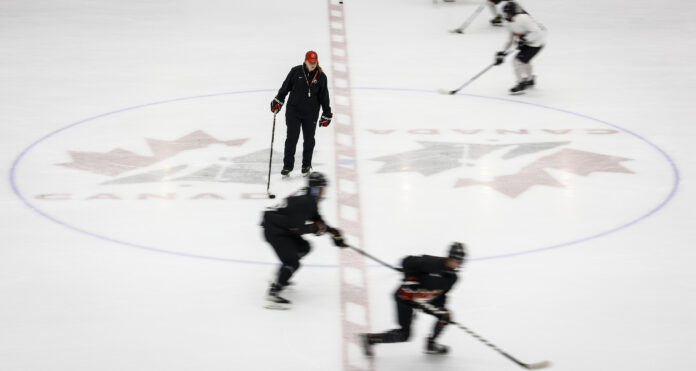If Hockey Canada is going to truly change its culture then it must break from its old governance processes, say three experts.
Brock McGillis, an inclusion advocate who played professional hockey, said on Monday that he is concerned that Hockey Canada will once again get mired in old thinking if it doesn’t radically change how it appoints its new board of directors. Hockey Canada announced on Saturday its intention to follow the recommendations set out in an interim report by former Supreme Court justice Thomas Cromwell, who is in the midst of an independent investigation into the national sports organization’s handling of an alleged group sexual assault involving members of Canada’s 2018 men’s junior hockey team.
Cromwell’s recommendations include making the new board of directors larger and more diverse. McGillis said he hopes that means looking to hockey’s nonconformists or even beyond the sport itself.
“I can go anywhere and I can tell you who plays hockey in a mall or at a school, they dress the same, talk the same, walk the same,” said McGillis. “We need to break those barriers to conformity and allow some individualism so that people can be human beings and themselves and not hockey robots.
“But if we’re picking adults, who are essentially the corporate version of that, then we’re doing a disservice. Because we’re not embracing and breaking the barriers to conformity, and we’re leading to the same result.”
Cromwell was tasked with a full governance review of Hockey Canada earlier this year after it was revealed that the organization reached an undisclosed settlement with a woman who alleged she was sexually assaulted by eight players, including members of the country’s 2018 world junior team. A second police investigation is also underway over an alleged group sexual assault involving members of the 2003 men’s world junior team.
None of the allegations have been proven in court.
Richard Powers, a professor at the University of Toronto’s Rotman School of Management, said to avoid making the same mistakes twice, Hockey Canada must put an emphasis on finding directors with appropriate skill sets like a background in finance or legal matters rather than experience within the sport itself.
Trending Now
Oakville teacher controversy: Professional standards under review by Ontario College of Teachers
RCMP clock Kelowna man going 270 kilometres per hour on Highway 1 west of Calgary
“Diversity of thought is just as important as the other more visible aspects of diversity,” said Powers, who noted that although the Cromwell report recommends expanding Hockey Canada’s board up to 13 seats there are ways to bring in even more voices to the organization’s leadership group.
5:00
What does the shake-up mean for Hockey Canada?
Powers said that once the new board is established different directors will be responsible for committees for responsibilities like audits, governance, and risk. Those committees, however, don’t have to be made up exclusively of board members.
“In corporate, it’s always the board members that populate those committees, and not-for-profit, it’s quite common to see non-board members as committee members,” said Powers, who is on the nominating committee for the Canadian Olympic Committee. “So it gives them an opportunity as well to go outside the board again, to look for skill sets and diverse candidates.”
Powers said that it’s important to have some former players on Hockey Canada’s new board as well as parents of players, but that should be to draw on their lived experience rather than maintain institutional knowledge. He also noted that the Calgary Stampede has a board of about 30 people, compared to Hockey Canada’s that has historically been less than 10, a surprisingly small group for such a large and powerful organization.
Cheri Bradish, associate professor at Toronto Metropolitan University who is the founder and managing director of the school’s Future Sport Lab, agreed and said that the idea of nominating someone with a background in hockey will actually limit the recruiting process.
“I think the institutional knowledge is a diversion from actually addressing at the core, the fact that these institutions need to be dramatically rebuilt,” said Bradish. “It’s actually counter to getting diverse open, critical thinking and decision making in a board.
“If you think about it, to claim consensus is also to cling to the past. So I would argue that it’s dated thinking.”
McGillis said he’s already seen some troubling indications that Hockey Canada’s recruitment process is already excluding the sport’s outsiders, including asking for candidate’s social media handles.
“My biggest fear with the board is that they’re going to reject those who they deem as disrupters of the culture, those who have been critical against it,” said McGillis. “That scares me because I think the actions of those in place to this point have shown that they want to keep a stranglehold on hockey and ensure that it remains — and I’m using this word flippantly — traditional.
“That concerns me because it limits the growth of the sport, it limits the beauty of the sport.”



